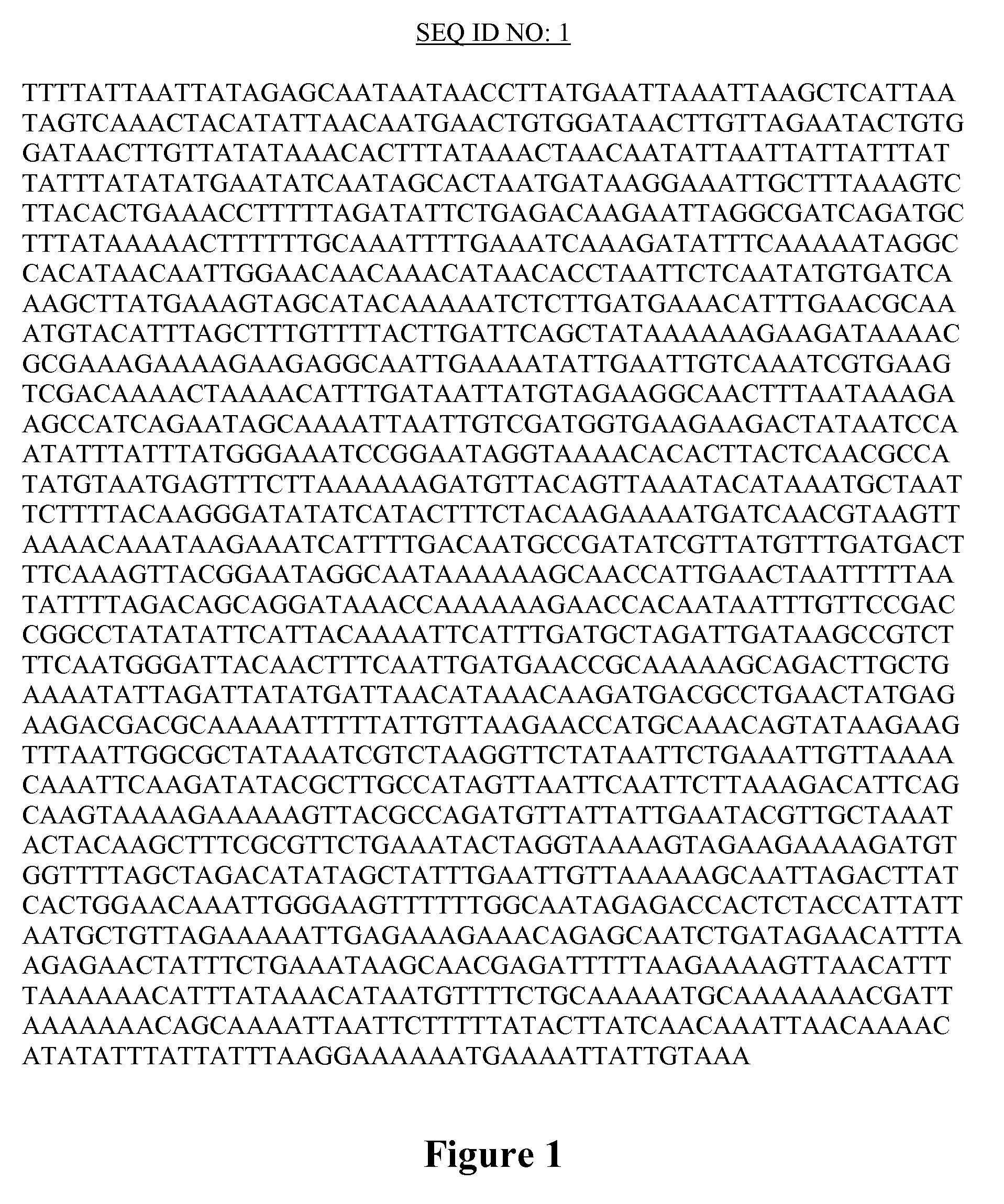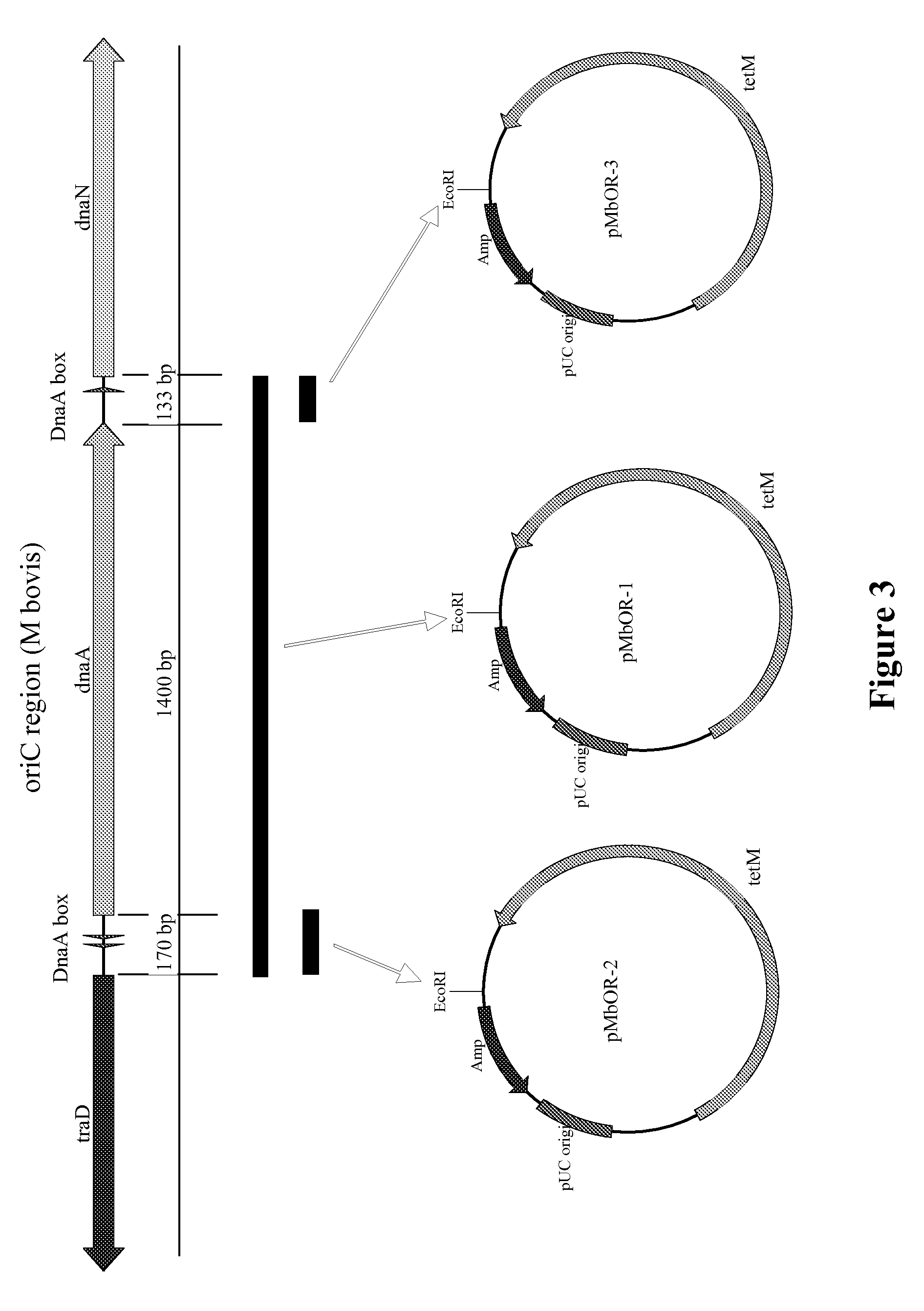Cattle vaccines
a technology for cattle and vaccines, applied in the field of cattle vaccines, can solve the problems of reducing the number or severity of lung lesions, antibiotic treatment may only mask i>m. bovis /i>infections temporarily, and antibiotic treatment is not effective in preventing i>m. bovis /i>infections of previously uninfected animals
- Summary
- Abstract
- Description
- Claims
- Application Information
AI Technical Summary
Benefits of technology
Problems solved by technology
Method used
Image
Examples
example 1
Tetracycline Expression in M. Bovis
[0081]The pathogenic M. bovis strain M23 was transformed with plasmids pISM 1002 and Tn4001miniTet. pISM 1002 harbors a 4.8 kb nucleic acid sequence encoding tetracycline. pISM 1002 has an origin of replication for E. coli but no origin of replication for mycoplasma. Tn4001miniTet carries a Tn4001 transposon element (including inverted repeated sequences) and a nucleic acid sequence encoding tetracycline, but lacks an origin of replication for M. bovis. No transformants were obtained with either pISM 1002 or Tn4001miniTet (at a detection limit of 8) in M. bovis. One possible cause of the observed lack of transformants may be the short half-life of the transformed plasmids in M. bovis and the large size of the tetracycline-encoding nucleic acid.
[0082]In order to construct self-replicative plasmids that will have longer half-life in the transformed mycoplasma cell, a genome fragment of M. bovis was obtained and tested for the presence of an origin o...
example 2
Selection of an Avirulent M. Bovis Strain
[0088]Strain M31 of M. bovis was passed 100 times (about 900 doublings) in vitro to reduce pathogenicity. The resulting strain (strain M31hi) was then tested for phenotype. The initial strain (M31lo) was minimally cytotoxic, non-invasive (in vivo test), and capable of inducing immunosuppression. Cytotoxicity, defined as percent of mycoplasma colonies that can kill apposed mammalian cells in vitro was still evident in a small proportion of the M31hi cell population. A lineage from a non-cytotoxic colony filter-cloned and final stock of M31hi that was 100% non-cytotoxic was derived. The strain gave 100% of colonies expressing VspA and VspL, as tested by immunoreaction of colony lifts with specific antibodies, indicating that the strain had not suffered significant phenotypic changes in surface protein expression.
[0089]This M31hi lineage was then tested for surface protein phenotype and ability to adhere to bovine lung epithelial cells in vitro....
example 3
Construction of a Removable Tc Marker
[0091]Plasmid pLOI 2227 was obtained from Dr. Ingram (University of Florida). A 280 basepair FRT-flanked cassette from pLOI 2227 was cloned into a pKS plasmid. The resulting construct contained two FRT sites flanking a multiple cloning site (MCS), as well as a second MCS. The tetM gene from plasmid pISM 1002 was then inserted into the MCS flanked by FRT sites.
[0092]A single cross-over insertion strategy was developed to enhance the chances of obtaining non-immunosuppressive mutants of M. bovis, since a single cross-over recombination event is expected to occur ˜100 times more frequently than a double cross-over recombination event. A single cross-over insertion strategy does not permit removal of the tetracycline marker from the M. bovis mutant. That is, an avirulent vaccine strain generated by a single cross-over event can carry resistance to tetracycline.
PUM
| Property | Measurement | Unit |
|---|---|---|
| length | aaaaa | aaaaa |
| immunogenic composition | aaaaa | aaaaa |
| antibiotic resistance activity | aaaaa | aaaaa |
Abstract
Description
Claims
Application Information
 Login to View More
Login to View More - R&D
- Intellectual Property
- Life Sciences
- Materials
- Tech Scout
- Unparalleled Data Quality
- Higher Quality Content
- 60% Fewer Hallucinations
Browse by: Latest US Patents, China's latest patents, Technical Efficacy Thesaurus, Application Domain, Technology Topic, Popular Technical Reports.
© 2025 PatSnap. All rights reserved.Legal|Privacy policy|Modern Slavery Act Transparency Statement|Sitemap|About US| Contact US: help@patsnap.com



